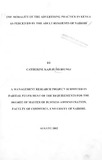| dc.contributor.author | Muriungi, Catherine K | |
| dc.date.accessioned | 2013-05-11T09:45:14Z | |
| dc.date.available | 2013-05-11T09:45:14Z | |
| dc.date.issued | 2002 | |
| dc.identifier.citation | Masters of business administration | en |
| dc.identifier.uri | http://erepository.uonbi.ac.ke:8080/xmlui/handle/123456789/21890 | |
| dc.description.abstract | This survey sought to find out the degree of morality perceived by the residents of
Nairobi in the advertising practice in Kenya, the specific ethical issues on which
advertising was perceived to be particularly unethical and the relationship between the
respondents perceptions and selected demographic characteristics.
There is a need to keep track of consumers' perceptions of the ethicality of advertising
through research because the effectiveness of advertising in its various functions,
including cultivation of brand attitudes, would be severely compromised by audiences
antagonistic towards it.
Data for the study was collected by use of a self-administered questionnaire, delivered by
the drop-and-pick method.
Analysis of the data revealed that advertising in Kenya was generally perceived not to be
ethical. It was judged to be particularly unethical in its effect on children and on the
dimension of bad taste. Low levels of immorality were perceived on its portrayal of
women, where it was found not to promote a negative image of women.
A relationship was found between respondents' perceptions on the ethicality of
advertising and their gender and level of religiousness, but no clear relationship with age was found. | en |
| dc.description.sponsorship | University of Nairobi | en |
| dc.language.iso | en | en |
| dc.title | The morality of the advertising practice in Kenya as perceived by the adult residents of Nairobi | en |
| dc.type | Thesis | en |
| local.publisher | School of business,University of Nairobi | en |

